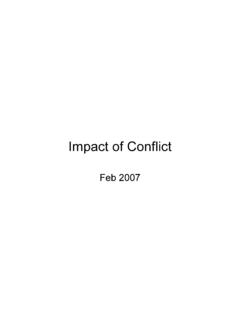Transcription of U.N. Peacekeeping: Few Successes, Many Failures, Inherent ...
1 INTERNATIONAL DIPLOMACY & PUBLIC POLICY CENTER, LLC peacekeeping : few successes , many Failures, Inherent flaws by Thomas W. Jacobson President, International Diplomacy & Public Policy Center, LLC Visiting Fellow for, and brief published by, the Center for Sovereignty & Security, a division of Freedom Alliance March- April 2012 The United Nations Charter states that it was founded, in part, to to save succeeding generations from the scourge of war.
2 In 2000, after a series of egregious failures in the 1990s, the ordered a comprehensive review of its own peacekeeping operations. The Brahimi Report, named after the panel chairman Lakhdar Brahimi (from Algeria), concluded that, the United Nations has repeatedly failed to meet the challenge. 1 The same is true today, though this review focuses primarily on the egregious failures of the 1990s, which best revealed the systematic flaws in peacekeeping .
3 The primary successes of the United Nations in peacekeeping have been in the areas of elections and communications (after peace agreements), diplomacy, and hindsight analysis of failures. Within the parameters of their duties, the majority of peacekeeping soldiers appear to conduct themselves honorably. Yet they are put in unnatural and untenable positions by serving as police or military personnel in foreign nations, charged with protecting people they have no family, personal, community, or national relationship to, which is why they are disinclined to risk their lives for people they don t know and have no commitment to.
4 The problems, failures, and abuses of foreigners serving as peacekeepers and personnel are numerous. They are lightly armed if at all, retreat if challenged or attacked, rarely if ever protect innocent civilians, and put civilians who flee to them for protection at deadly risk by abandoning them when their lives are at risk. They sexually exploit local women and girls, and often become the primary transmitters of HIV/AIDS and sexually transmitted diseases to the population.
5 Yet they are rarely punished for any crimes, rapes, or other offenses. Generally, they have a reputation of caring little about the people they are sent to protect. peacekeeping failures in the 1990s were partially responsible for the murder or massacre of nearly 1 million innocent civilians and citizen soldiers (trying to protect their communities) in Rwanda, Bosnia, and other places.
6 During the same decade, 798 peacekeepers died too, plus soldiers serving under command in support of missions, most notably the 18 who were murdered, dismembered, and shamefully dragged through the streets of Mogadishu, Somalia, in 1993. 3472 Research Parkway, #104-231 Colorado Springs, Colorado 80920 719-268-7198; 719-651-3366 cell Code of Conduct The United Nations has Ten Rules that comprise the Code of Personnel Conduct for Blue Helmets, including the following: 1.
7 Dress, think, talk, act and behave in a manner befitting the dignity of a disciplined, caring, considerate, mature, respected and trusted soldier, displaying the highest integrity and impartiality. 3. Treat the inhabitants of the host country with respect, courtesy and consideration. You are there as a guest to help them .. Neither solicit or accept any material reward, honor or gift.
8 4. Do not indulge in immoral acts of sexual, physical or psychological abuse or exploitation of the local population .. especially women and children. 5. Respect and regard the human rights of all. 10. Exercise the utmost discretion in handling .. matters of official business which can put lives into danger. For the most part, these are noble standards, which are most likely to be upheld when a person is around people they know, but more likely to be violated when around vulnerable foreigners because of the fallen nature of mankind.
9 Also, note that rule 4 has the qualifiers of abuse or exploitation, which the interprets as permitting sexual immorality that is not proven to be abusive or exploitative. A few successes The points to Cambodia as one of its successes , but its primary success was to facilitate a nation- wide free election after a new government replaced the Khmer Rouge. Haiti is another success, where the has had five mostly concurrent peacekeeping missions since 1993, with any lasting success difficult to ascertain.
10 The first peacekeeping mission was the United Nations Truce Supervision Organization (UNTSO) in Israel that began in May 1948 and continues today, but the sole deterrent to violence and attacks on Israel has been Israeli intelligence and military forces. Some view the Second United Nations Emergency Force (UNEF II) helping to keep the peace on the Egyptian- Israeli border from October 1973 to July 1979 as a success.





